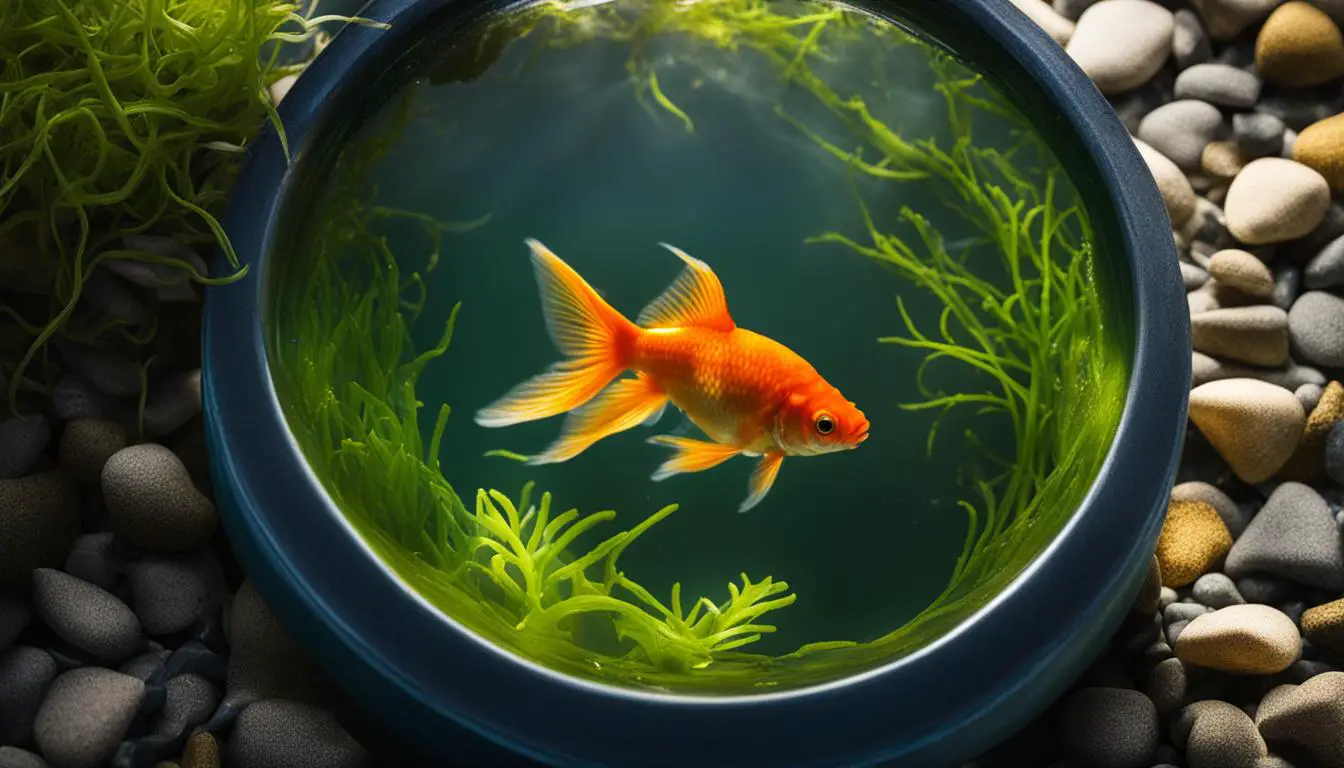Last Updated on 2 months by admin
Goldfish are beloved pets that can bring joy and beauty to any aquarium. However, many goldfish owners face the unfortunate problem of their fish dying quickly. It can be disheartening to see your goldfish perish, but understanding the common causes of goldfish mortality can help you provide better care and extend their lifespan.
There are several factors that contribute to goldfish dying at a fast rate. These include unsuitable living conditions, poor water quality, overfeeding, fighting with other fish, accidents or injuries, diseases, and old age. By addressing these issues and implementing proper care strategies, you can prevent goldfish deaths and improve their overall health and well-being.
In this article, we will delve into each of these common causes in detail and provide you with valuable tips on how to keep your goldfish alive and thriving. From setting up the right tank environment to maintaining optimal water quality, feeding them properly, preventing diseases, and recognizing signs of stress, we will cover everything you need to know to ensure the longevity of your goldfish.
Key Takeaways:
- Unsuitable living conditions and poor water quality are major contributors to goldfish deaths.
- Overfeeding can lead to digestive issues and water pollution, affecting the health of goldfish.
- Choosing compatible tank mates and preventing aggression can prevent injuries and stress in goldfish.
- Regular observation, quarantine of new fish, and disease prevention measures are crucial for maintaining goldfish health.
- Providing suitable care, including a proper tank setup, optimal water quality, and a stress-free environment, can extend the lifespan of goldfish.
Unsuitable Living Conditions
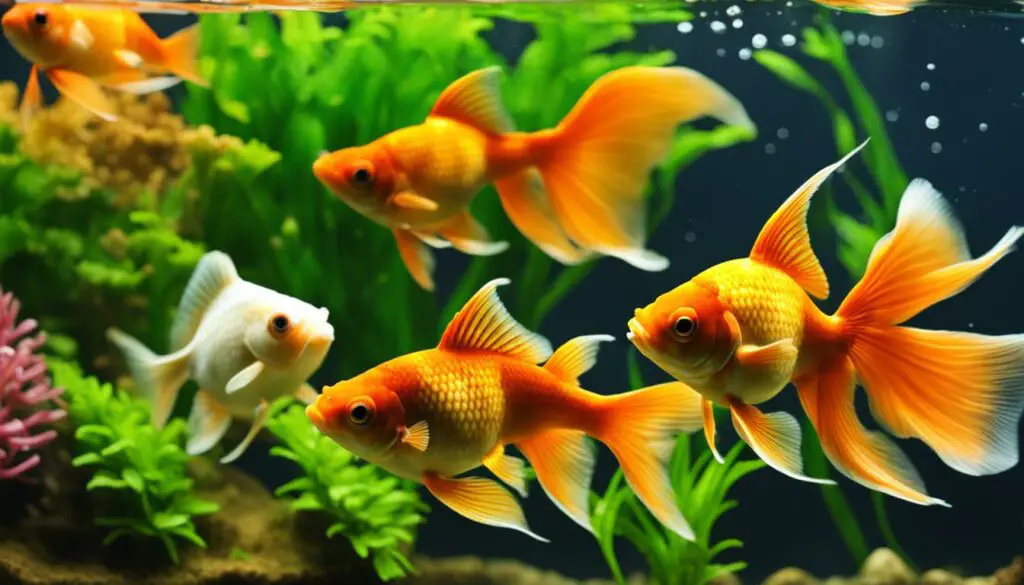
One of the main reasons why goldfish die is because they are kept in unsuitable living conditions. Goldfish require a spacious tank with ample swimming space and good filtration to ensure optimal water quality.
Keeping goldfish in a tank that is too small restricts their movement and can lead to overcrowding. This can cause stress and increase the likelihood of diseases. It is essential to provide a tank that is appropriate for the size and number of goldfish you have. As a general rule, allow at least 20 gallons of water per goldfish.
A proper filtration system plays a crucial role in maintaining water quality for goldfish. Filters help remove harmful substances, such as ammonia and nitrites, from the water. Without adequate filtration, these toxins can build up and cause various health problems, including ammonia burns, fin rot, and swim bladder issues. Choose a filter that is specifically designed for the size of your goldfish tank and ensure regular maintenance, including cleaning or replacing filter media, to prevent clogging and maintain optimal performance.
Additionally, it is important to consider the compatibility of tank mates when housing goldfish. Goldfish are generally peaceful, but they may become stressed or injured when kept with aggressive fish or those that nip at their fins. Avoid keeping goldfish with species that have the potential to harm or stress them. Research the temperament, size, and water parameter requirements of potential tank mates to ensure a harmonious aquarium environment.
Proper tank setup and water quality maintenance are vital for the health and longevity of goldfish. By providing a suitable tank and filtration system and considering the compatibility of tank mates, you can create a conducive environment for your goldfish to thrive.
Poor Water Quality
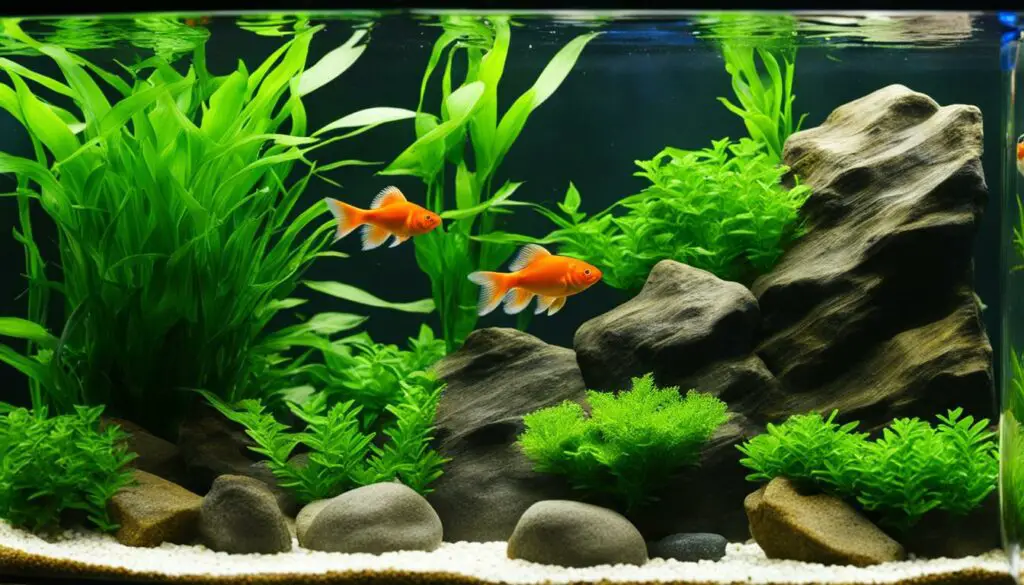
Poor water quality is a major contributor to goldfish deaths. Goldfish require clean and properly balanced water to thrive. This includes maintaining appropriate levels of ammonia, nitrite, and nitrate, as well as proper pH and temperature. Failure to adequately manage water quality can lead to stress, diseases, and other health issues in goldfish, ultimately causing their death.
Regular water testing, proper filtration, and regular water changes are essential for maintaining optimal water quality and preventing goldfish mortality. By monitoring key parameters and taking necessary actions, you can create a healthy aquatic environment for your goldfish.
Here are some crucial steps to maintain water quality:
- Water testing: Regularly test the water parameters such as ammonia, nitrite, nitrate, pH, and temperature. This will help you identify any imbalances or issues and allow you to take corrective measures accordingly.
- Filtration: Invest in a high-quality filtration system suitable for your aquarium size. A good filtration system will help remove waste, excess nutrients, and toxins, ensuring cleaner water for your goldfish.
- Water changes: Regularly change a portion of the aquarium water to dilute accumulated pollutants and maintain optimal water quality. Aim for weekly water changes of about 20-30% of the total volume.
Remember, goldfish are sensitive to even slight changes in water quality, so it’s crucial to stay vigilant and maintain a consistent and suitable environment for them.
| Parameter | Ideal Range | Importance |
|---|---|---|
| Ammonia | 0 ppm | High levels of ammonia are toxic and can cause stress and health issues. |
| Nitrite | 0 ppm | Nitrite is a byproduct of ammonia oxidation and can be toxic to goldfish in high concentrations. |
| Nitrate | High nitrate levels can be harmful to goldfish if not maintained within the acceptable range. | |
| pH | 6.5-8.0 | Fluctuations in pH can cause stress to goldfish, affecting their overall health and well-being. |
| Temperature | 65-75°F (18-24°C) | Extreme temperature fluctuations can weaken goldfish and make them more susceptible to diseases. |
Properly managing water quality is key to ensuring the long-term health and survival of your goldfish. By prioritizing regular testing, filtration, and water changes, you can create an environment that promotes their well-being and reduces the risk of mortality due to poor water conditions.
Overfeeding
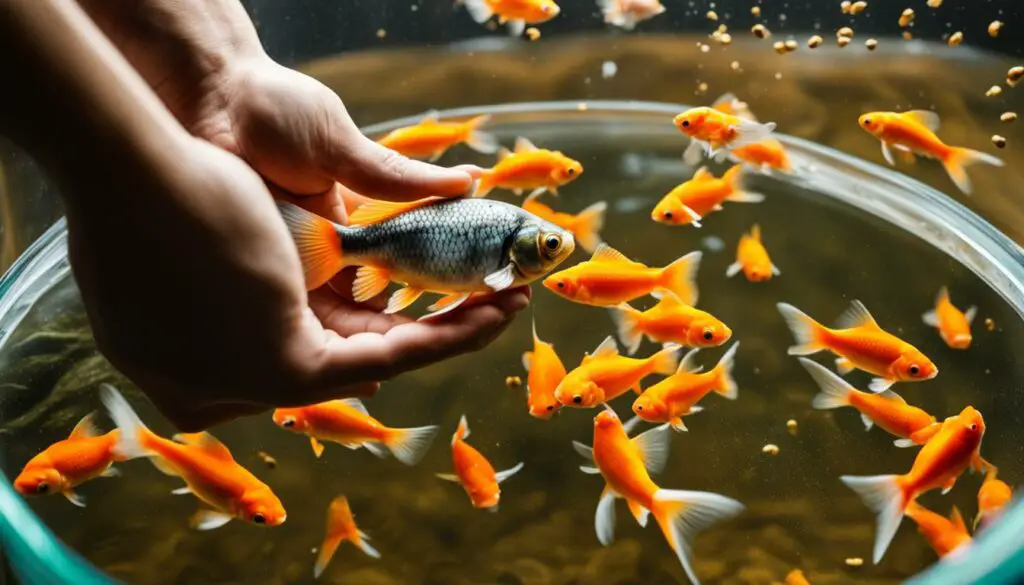
One common mistake that goldfish owners make is overfeeding their fish. This can have detrimental effects on their health and even lead to their rapid demise. Goldfish have small stomachs and should only be fed small amounts of food at a time to avoid digestive issues, constipation, and water pollution.
Proper goldfish feeding is essential for their well-being and longevity.
To prevent overfeeding, it is important to follow a proper feeding schedule and provide a balanced diet for your goldfish. Feeding them small portions of high-quality fish food once or twice a day is sufficient. In addition, it is important to avoid feeding them food that is not suitable for their dietary needs, such as human food or low-quality fish flakes.
“Overfeeding can cause digestive issues, constipation, and water pollution due to uneaten food.”
Follow these tips for proper goldfish feeding:
- Provide small portions of food at a time to avoid overeating.
- Feed them high-quality fish food that is specifically formulated for goldfish.
- Avoid feeding them human food or other inappropriate food items.
- Follow a regular feeding schedule to establish a routine.
- Monitor their eating habits and adjust their diet as needed.
By avoiding overfeeding and providing a balanced diet, you can promote the overall health of your goldfish and prevent untimely deaths.
Remember, goldfish require proper care and attention to thrive. Feeding them appropriately is just one part of their overall well-being. Keep in mind other factors such as tank size, water quality, and tank mates to ensure the best possible living conditions for your goldfish.
Fighting with Other Fish

Fighting with other fish in the aquarium can be detrimental to the health and lifespan of your goldfish. It can result in injuries, stress, and even death. Goldfish are naturally peaceful creatures and should be kept with compatible tank mates to maintain a peaceful and harmonious environment.
When choosing tank mates for your goldfish, it’s essential to consider factors such as size, temperament, and water parameter requirements. Keeping aggressive fish or overcrowding the tank can lead to bullying and continuous stress for your goldfish. This continuous stress weakens their immune system, making them more susceptible to diseases.
By preventing fighting among fish, you can significantly reduce the risk of diseases and ensure the well-being of your goldfish. Here are some tips to promote a peaceful tank environment:
- Select tank mates that have similar temperaments and behaviors.
- Ensure the tank is spacious enough to accommodate all the fish comfortably.
- Monitor the tank regularly to identify any signs of aggression or bullying.
- Provide plenty of hiding spots and visual obstacles to create separate territories.
- Feed the fish adequately to minimize competition for food.
Creating a peaceful and harmonious tank environment for your goldfish not only prevents fights but also enhances their overall health and well-being. It allows them to thrive in a stress-free environment, boosting their immune system and preventing diseases.
Remember, goldfish are social creatures and should not be kept alone. They thrive when they have companions but make sure to choose tank mates wisely to prevent any conflicts.
Differentiating Between Male and Female Goldfish
It’s important to note that male goldfish can be more territorial and exhibit aggressive behavior, especially during breeding periods. If you have both male and female goldfish, monitor their behavior closely during mating seasons to prevent any conflicts or aggression. Separate them temporarily if necessary.
Signs of Aggression in Goldfish
Goldfish may exhibit certain signs of aggression when they feel threatened or during territorial disputes. These signs include:
- Chasing other fish around the tank persistently
- Biting or nipping at other fish
- Flaring fins or expanding gill covers to appear larger and more dominant
- Showing signs of stress, such as hiding, refusing to eat, or becoming lethargic
If you notice any of these signs, it’s crucial to take immediate action to prevent further aggression and potential harm to your goldfish. Removing the aggressive fish temporarily or rearranging the tank decor to create new territories can help diffuse tensions.
By maintaining a peaceful tank environment and preventing fights among fish, you can ensure the well-being and longevity of your goldfish. Remember, a stress-free environment contributes to their overall health, making them less prone to diseases and enhancing their quality of life.
Accidents or Injuries
Accidents or injuries can also lead to goldfish deaths. Goldfish are notorious for their propensity to jump out of tanks, which can result in fatalities. They may also get stuck in filters or decorations, causing distress and potential harm. Additionally, rough handling can cause physical injuries to these delicate creatures.
To prevent accidents and injuries that could lead to the death of your goldfish, it is crucial to take certain precautions:
- Provide a secure tank cover: Installing a tight-fitting lid or cover on your goldfish tank is essential to prevent them from leaping out. This protective measure greatly reduces the risk of accidental death.
- Regularly inspect the tank: Take the time to carefully inspect the tank and its accessories. Look out for any potential hazards that could harm your goldfish, such as sharp objects or small openings they could get trapped in. Remove or modify such hazards to ensure a safe environment.
- Handle with care: When handling goldfish, it is vital to be gentle and avoid sudden movements. Careless handling can lead to stress, injury, or even death. Support their bodies properly and avoid excessive force.
Note: Creating a safe environment and handling goldfish with care can minimize accidents and injuries that may jeopardize their lives.
To emphasize the importance of preventing accidents or injuries in goldfish, let’s consider the following quote:
“Providing a safe and secure environment is crucial for the well-being and longevity of goldfish. Every effort should be made to prevent accidents or injuries, as they can have dire consequences on their health and survival.” – Goldfish Expert
By implementing safety measures, you can ensure the well-being of your goldfish and reduce the risk of accidental deaths. Remember, prevention is key to maintaining a healthy and thriving aquatic environment.
Goldfish Accidents and Injuries Prevention Tips:
| Tips | Description |
|---|---|
| 1. Provide a secure tank cover | Prevents goldfish from jumping out of the tank. |
| 2. Regularly inspect the tank | Identify and remove potential hazards that may harm goldfish. |
| 3. Handle goldfish with care | Minimize stress and injuries by gentle and proper handling techniques. |
Diseases
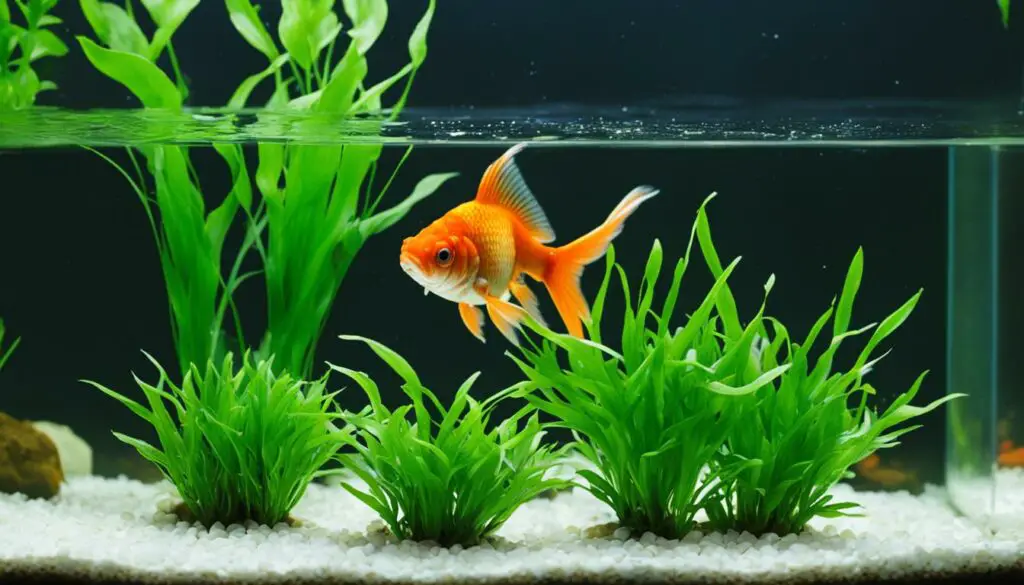
Diseases are another major cause of goldfish mortality. Goldfish are susceptible to various infections and illnesses, including bacterial, fungal, and parasitic diseases. Poor water quality, stress, and inadequate nutrition can weaken their immune system, making them more prone to diseases.
Regular observation of goldfish for any signs of illness, quarantine of new fish, and proper disease prevention measures can help prevent the spread of diseases and reduce goldfish deaths. It is important to consult with a veterinarian or experienced fish keeper if you suspect your goldfish is sick.
| Disease | Symptoms | Treatment |
|---|---|---|
| Bacterial infections | Frayed fins, ulcers, red spots on the body | – Isolate the infected fish – Treat with appropriate antibacterial medication – Improve water quality |
| Fungal infections | White cotton-like patches on skin or fins | – Isolate the infected fish – Treat with antifungal medication – Improve water quality |
| Parasitic infections | Excessive scratching, visible parasites on the fish | – Isolate the infected fish – Treat with appropriate anti-parasitic medication – Sterilize tank and equipment |
“Preventing diseases in goldfish is crucial for their overall health and longevity. By taking proactive measures to maintain water quality, minimize stress, and provide proper nutrition, goldfish can have a better chance of avoiding common diseases. Prompt identification and appropriate treatment are essential to prevent the spread of infections and reduce goldfish deaths.” – Dr. Samantha Thompson, Aquatic Veterinarian
Regularly monitoring your goldfish for any abnormal behavior or physical changes can help catch diseases early on. Quarantining new fish before introducing them to your main tank is also a good practice to prevent the introduction of diseases. Additionally, maintaining a clean and well-maintained tank, providing a balanced diet, and avoiding overcrowding can significantly reduce the risk of diseases among goldfish.
Remember, prevention is always better than cure when it comes to keeping goldfish healthy and disease-free.
Old Age
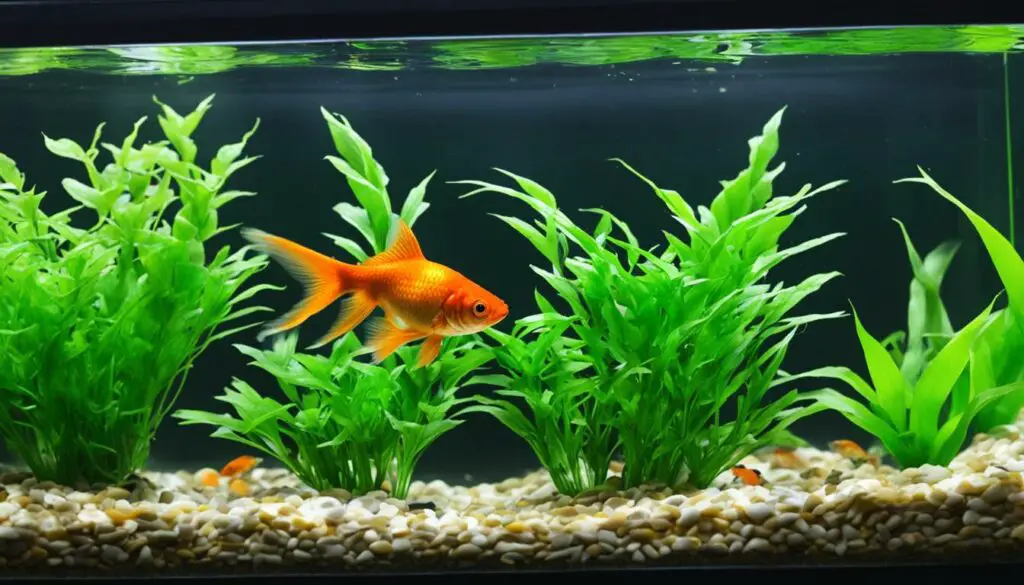
Just like any living creature, goldfish have a natural lifespan, and eventually, they will die of old age. Goldfish can live for many years if provided with proper care and a suitable environment. However, it is important to note that their lifespan can vary depending on the breed, genetics, and overall health.
Providing a nutritious diet, optimal water quality, and a stress-free environment can help extend the lifespan of goldfish and ensure they live a fulfilling and healthy life.
Goldfish care tips to extend their lifespan:
- Feed them a balanced and nutritious diet
- Maintain optimal water quality through regular testing and maintenance
- Take steps to prevent diseases and provide proper care
- Create a stress-free environment by avoiding aggressive tank mates and maintaining a peaceful tank
By following these goldfish care tips, you can increase the chances of your goldfish living a long and happy life.
Providing a Nutritious Diet
A proper diet is crucial for the health and longevity of your goldfish. Feed them high-quality flakes or pellets specifically made for goldfish, and avoid overfeeding. Goldfish have small stomachs and can easily become constipated if given too much food. Feed them small portions once or twice a day, ensuring that they can consume all the food within a few minutes.
Maintaining Optimal Water Quality
Clean and properly balanced water is essential for goldfish to thrive. Regularly test the water parameters, including ammonia, nitrite, nitrate, pH, and temperature. Keep the tank clean by performing regular water changes and maintaining an efficient filtration system. Stable water conditions will help prevent stress and reduce the risk of diseases.
Preventing Diseases and Providing Proper Care
Goldfish are prone to various diseases, so it’s important to take preventive measures. Quarantine new fish before introducing them to the main tank to avoid introducing diseases. Keep the tank clean, remove any uneaten food or waste promptly, and provide a stress-free environment. Regularly observe your goldfish for any signs of illness, such as changes in behavior, appearance, or appetite, and seek appropriate treatment if needed.
Creating a Stress-Free Environment
Goldfish can become stressed by aggressive tank mates or a crowded tank. Choose compatible tank mates that have similar temperaments and water parameter requirements. Provide adequate swimming space and hiding spots for your goldfish to minimize stress. A peaceful environment will help promote their overall well-being and extend their lifespan.
How to Dispose of Dead Goldfish
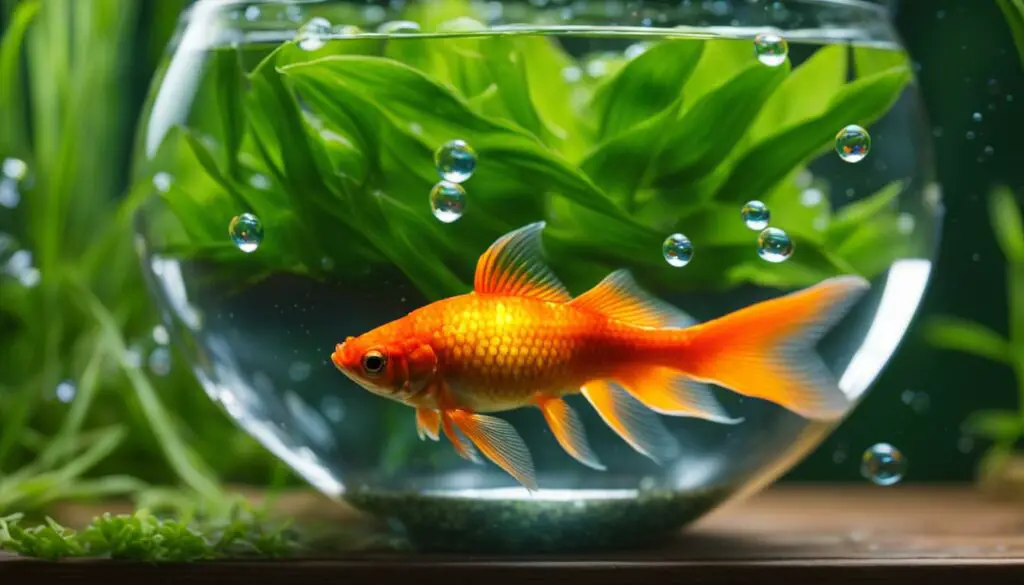
When a goldfish dies, it is important to properly dispose of the body to avoid any potential health risks. Flushing dead goldfish down the toilet is not recommended as it can pollute the water and spread diseases to wild fish. Instead, there are several options for disposing of a deceased goldfish:
- Removing the fish with a net: If you have a small net or a fish-catching tool, you can gently scoop up the dead goldfish from the tank. Make sure to handle the fish with care and avoid damaging the body.
- Burying the goldfish: Dig a deep hole in your backyard or a designated pet burial area. Place the goldfish in the hole and cover it with soil. This method allows for a respectful farewell to your beloved goldfish.
- Throwing the goldfish in the trash: If burying the goldfish is not an option, you can double-bag the deceased fish and dispose of it in the regular trash. Be sure to seal the bags tightly to prevent any potential odor or leakage.
- Cremation: Some pet owners choose to opt for pet cremation services. Contact your local pet crematorium or veterinary clinic to inquire about their services and fees.
Remember, choose the method of disposal that aligns with your personal preference and follows local regulations.
After handling the dead goldfish, it is crucial to sterilize any equipment used in the process to prevent the spread of diseases. This includes the net, fish-catching tool, or any other items that came into contact with the deceased fish. Cleaning them thoroughly with a bleach solution or hot soapy water will ensure proper sanitation.
Properly disposing of a dead goldfish shows respect for their life and prevents potential hazards. By following these guidelines, you can say goodbye to your goldfish in a responsible and caring manner.
How to Keep Goldfish Alive
Providing proper care is essential for keeping your goldfish alive and thriving. By following these goldfish care tips, you can extend their lifespan and ensure their well-being.
Goldfish Tank Setup
Creating a suitable tank setup is crucial for the health of your goldfish. Make sure your tank provides adequate space for swimming and growth. A general rule of thumb is to allow 20 gallons of water per goldfish. Proper filtration is also important to maintain water quality. Choose a filter that is appropriate for the size of your tank and regularly clean or replace filter media.
Proper Goldfish Feeding
Feeding your goldfish a balanced diet is key to their overall health. Use high-quality fish food that is specifically formulated for goldfish. Feed them small portions two to three times a day, taking care not to overfeed. Remember that goldfish have small stomachs and excess food can lead to digestive issues and water pollution. Monitor their eating habits and adjust the amount of food accordingly.
Maintaining Water Quality for Goldfish
Regularly testing and maintaining water quality parameters is essential for the well-being of your goldfish. Keep an eye on ammonia, nitrite, nitrate levels, as well as pH and temperature. Ammonia and nitrite should be maintained at zero, while nitrate levels should be kept below 40 ppm. Perform regular water changes to remove toxins and ensure a healthy environment for your goldfish.
Preventing Diseases in Goldfish
Preventing diseases is crucial for keeping your goldfish alive. Maintain good hygiene practices by cleaning the tank regularly, removing uneaten food, and avoiding introducing pathogens into the tank through new fish or decorations. Quarantine new fish before adding them to the main tank to prevent the spread of diseases. If you notice any signs of illness, seek advice from a veterinarian or experienced fish keeper to diagnose and treat the issue.
Regular Monitoring and Research
Regularly monitor the behavior and appearance of your goldfish to detect any changes or signs of distress. Stay updated with the latest research and advancements in goldfish care to ensure you are providing the best possible care. Join online forums or local fishkeeping communities to learn from experienced hobbyists and share knowledge.
Incorporating these goldfish care tips into your routine and providing a suitable environment will help keep your goldfish healthy, happy, and extend their lifespan.
Conclusion
Proper care and attention are essential for extending the lifespan of your goldfish and ensuring their well-being. By addressing common issues such as unsuitable living conditions, poor water quality, overfeeding, fighting with other fish, accidents or injuries, diseases, and old age, you can prevent goldfish deaths and promote their health.
Start by providing a suitable tank setup with enough space for your goldfish and a good filtration system to maintain optimal water quality. Regularly test the water parameters and perform water changes to ensure a clean and balanced environment. Avoid overfeeding your goldfish, as it can lead to digestive issues and water pollution. Feed them a balanced diet in appropriate portions.
Prevent aggression and stress in your aquarium by choosing compatible tank mates and ensuring the right environment. Inspect the tank regularly for any potential hazards that could cause accidents or injuries to your goldfish. Lastly, keep a close eye on their health, watch out for signs of illnesses, and consult with professionals if needed.
With proper care and attention, your goldfish can live a long and fulfilling life. Remember to maintain a suitable tank setup, ensure optimal water quality, provide proper nutrition, prevent aggression, and practice good hygiene. By following these goldfish care tips, you can extend their lifespan and enjoy their presence in your aquarium for years to come.
FAQ
Why do goldfish die so fast?
Goldfish can die quickly due to various factors such as unsuitable living conditions, poor water quality, overfeeding, fighting with other fish, accidents or injuries, diseases, and old age.
What are the common causes of goldfish mortality?
The common causes of goldfish mortality include unsuitable living conditions, poor water quality, overfeeding, fighting with other fish, accidents or injuries, diseases, and old age.
How can unsuitable living conditions lead to goldfish deaths?
Unsuitable living conditions, such as keeping goldfish in small tanks or tanks with aggressive tank mates, can cause stress, poor water quality, and other health issues in goldfish, ultimately leading to their death.
How does poor water quality contribute to goldfish deaths?
Poor water quality can lead to stress, diseases, and other health issues in goldfish, ultimately causing their death. Maintaining proper water parameters and regular water changes are essential for preventing goldfish mortality.
What role does overfeeding play in goldfish deaths?
Overfeeding can cause digestive issues, constipation, and water pollution, which can lead to the death of goldfish. Feeding goldfish small portions of high-quality fish food once or twice a day is sufficient to prevent overfeeding.
How does fighting with other fish contribute to goldfish mortality?
Goldfish can experience injuries, stress, and weakened immune systems when they engage in fighting with other fish. Keeping goldfish with compatible tank mates and preventing aggression can help prevent goldfish deaths caused by fighting.
How can accidents or injuries lead to goldfish deaths?
Goldfish can jump out of the tank, get stuck in filters or decorations, or suffer physical injuries from rough handling, which can lead to their death. Providing a secure tank cover and handling goldfish with care can help prevent accidents and injuries.
What are the common diseases that can cause goldfish deaths?
Goldfish are susceptible to various infections and illnesses, including bacterial, fungal, and parasitic diseases. Poor water quality, stress, and inadequate nutrition can weaken their immune system and make them more prone to diseases.
Do goldfish die of old age?
Yes, goldfish, like any living creature, have a natural lifespan and will eventually die of old age. However, providing proper care, such as a nutritious diet, optimal water quality, and a stress-free environment, can help extend their lifespan.
How should I dispose of a dead goldfish?
Flushing dead goldfish down the toilet is not recommended as it can pollute the water. Options such as removing the fish with a net, burying it in a deep hole, throwing it in the trash (double-bagged), or cremation can be considered. Please check local regulations and personal preferences when deciding how to dispose of a dead goldfish.
How can I keep my goldfish alive?
To keep goldfish alive and healthy, it is important to provide them with suitable living conditions, maintain optimal water quality, feed them a balanced diet in appropriate portions, prevent aggression among tank mates, and practice good hygiene to prevent diseases. Regular monitoring and seeking professional advice can also help ensure their well-being.
Source Links
- https://thegoldfishtank.com/goldfish-info/biology/why-goldfish-die/
- https://fishlab.com/why-your-fish-are-dying/
- https://pubs.nmsu.edu/_w/W105/index.html

